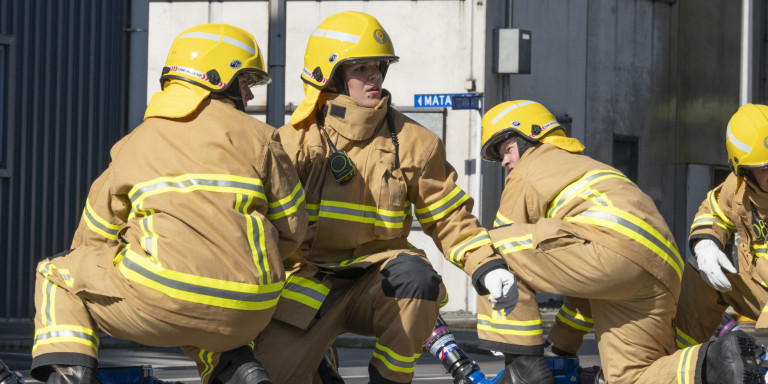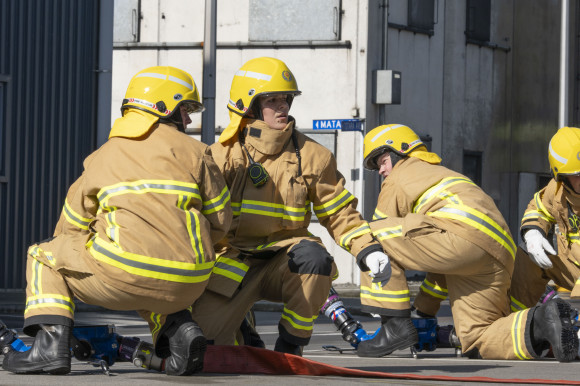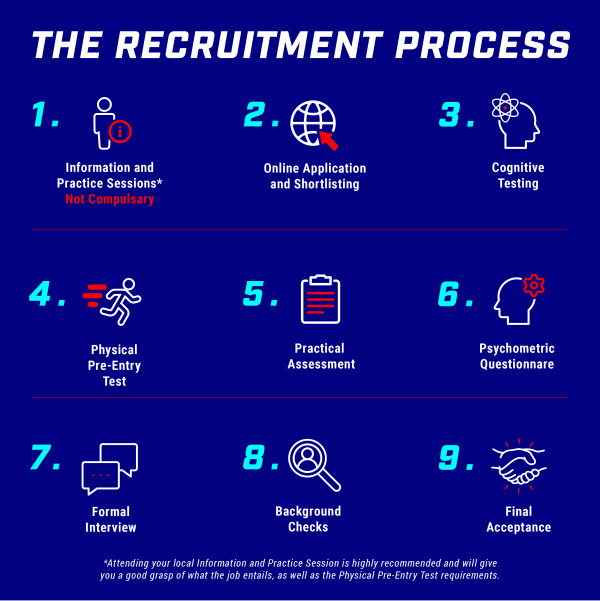Recruitment process
To become a Career Firefighter, you’ll need to complete our Recruitment Process. Each step must be completed successfully before progressing to the next.
Use this space to note any additional information about your escape plan, i.e. who will assist
Smoke is poisonous and more deadly than flames.
If you breathe smoke for more than a few breaths it can kill you.
A house fire can kill you in less than three minutes.
Don't spend time trying to save possessions.
A closed door buys you time.
It slows down the spread of fire, giving you more time to get to safety.
People have died by going back into a fire.
Don't leave the meeting place to go back inside for any reason.


To become a Career Firefighter, you’ll need to complete our Recruitment Process. Each step must be completed successfully before progressing to the next.
On this page
Taking the first step can be the hardest. We break it down here so you can back yourself!
We run the Recruitment Process at a national level twice a year. It takes 6-9 months from the time you submit your application to your placement on a Recruit Training Course.

We encourage you to attend an Information and Practice day (opens in a new tab) which is aimed at giving you a good grasp of what the job entails. You will have a chance to chat with our Career Firefighters, ask questions, and hear the ins and outs of the role from the experts themselves.
Where possible we will aim to show you some, or all, of the Physical Pre-Entry Test with an instructor demonstration. This is valuable to gauge where you are at physically against our requirements, and receive guidance that allows you to tailor your training programme.
This is the formal application stage. Make sure you’re familiar with ourentry requirements(opens in a new tab).
Applications to become a Career Firefighter open nationally twice per year. Applications must be made via our careers website. Once submitted, you will receive an email to confirm that your application has been received.
If you are successful at the online application stage, you will be asked to complete the tasks below. We are looking for the cognitive abilities and personality preferences needed for the firefighter role, along with the necessary skills and knowledge to understand job-related concepts for the role.
This is a timed, 10-minute assessment that covers numerical ability, verbal ability, deductive reasoning (drawing logical conclusions from available information), and abstract reasoning (identifying patterns in nonverbal stimuli).
Candidates will undergo another timed, 10-minute assessment.
This is a supervised assessment, and will take place at Fire and Emergency premises either prior to, or on the day of your Physical Pre-Entry Test.
You are only required to complete this questionnaire if you are progressing to a formal interview. You will be presented with a number of statements where you will be asked to select the statement that is most like you and the one that is least like you. This is used to measure your preferred or typical way of working – there are no right or wrong answers.
The Physical Pre-Entry Test ensures that candidates who are successful through the recruitment process have the minimum level of strength and fitness for the 12-week Recruit Training Course.
The test is comprised of two parts:
This includes 8 exercises simulating scenarios that may be experienced by a firefighter.
You will be timed from the start of the first job-related task until completion of the last task. Your total time must be 8 minutes and 15 seconds or less. There will be then a 7-minute rest before commencing the strength and endurance test.
This includes 4 exercises that test a candidate’s general strength.
You will also be required to complete 2 final assessments for:
For training tips and guidelines see our PPT Guide and Training Plan [PDF, 19 MB](opens in a new tab).
Watch the video below to see what the test entails and how to prepare:
At the Practical Assessment Centre, you will undergo a series of individual and team activities, where you will be assessed on your ability to:
The PAC is held at a Training Centre, generally in the following locations: Auckland, Wellington, Christchurch and Dunedin. It will take approximately 3 hours.
You will be required to complete your PAC assessment at the centre nearest to your preferred location unless prior arrangements have been made with the Recruiting Team.
View our current testing dates(opens in a new tab) for a list of confirmed PAC locations each round.
Successful candidates will be invited to attend a behavioural and situational based interview.
The interview will take approximately 1 hour with questions asked around the core competencies of a firefighter. There will be up to three panel members.
Check out sometipsand general guidance on how to prepare(opens in a new tab) for behavioural interviews.
After your successful interview the following background checks are required:
Make sure there are no surprises by requesting a copy of your own police check before commencing the application process. The Ministry of Justice website has information ongetting a copy of your criminal record .
You will be asked to do a medical evaluation to assess your suitability for the role and to identify any potential health related issues prior to employment.
The cost of your initial medical examination will be met by Fire and Emergency New Zealand. We will ask you to arrange a pre-employment medical appointment with your usual medical centre, and a hearing appointment with an audiologist.
We conduct two work-related reference checks which requires your referees to fill in an online questionnaire.
Congratulations you’ve arrived at the final stage of the process!
You will be given a conditional offer of employment which means that in order for Fire and Emergency to confirm your training and employment, and before you can start your recruit training, we require the following:
Successful candidates will attend a paid 12-week live-in course at our National Training Centre in Rotorua. Meals and accommodation are provided for the duration of the course.
Recruit Training Courses normally commence in January, April, July, and September each year.
We'll keep in touch with you throughout the process and do our best to meet your preferred start date wherever possible.
The Recruit Training Course is the most challenging, but the most rewarding part of the whole process. It includes studying and practicing to develop the mental and physical resilience needed to start work as a firefighter.